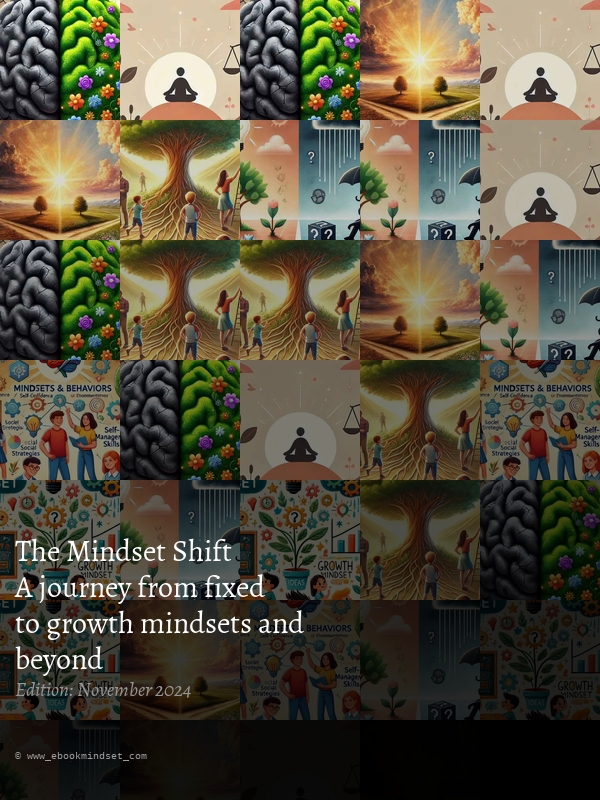What is Mindset Marketing?
In today's fiercely competitive business landscape, mindset marketing has emerged as a critical element for achieving sustainable success. This innovative approach transcends traditional marketing strategies by prioritizing the profound impact of mindset on marketing effectiveness. It's not just about the tactics; it's about the internal beliefs, attitudes, and biases that shape a marketer's decisions and actions. This article delves into the precise definition of mindset marketing, explores its significance, dissects its key components, examines its practical applications, and offers insightful guidance on cultivating a growth-oriented marketing mindset. Ultimately, we aim to equip you with the knowledge to leverage the power of mindset for exceptional marketing results.
Mindset marketing is a strategic approach that focuses intently on the mental frameworks, attitudes, beliefs, and biases that marketers adopt. These internal factors profoundly influence their decision-making processes and significantly shape customer interactions. It encompasses the psychological aspects that affect how marketers perceive their roles, understand their customers, and develop their marketing strategies. At its very core, mindset marketing fosters a deeply customer-centric perspective, driving innovation, fostering deeper engagement, and ultimately resulting in more effective and impactful marketing campaigns.
Unlike traditional marketing, which often focuses solely on tactics and channels, mindset marketing digs deeper. It recognizes that the marketer's own beliefs, assumptions, and perspectives directly impact the effectiveness of their strategies. A marketer with a fixed mindset might be resistant to new ideas and less likely to adapt to changing market conditions. They might cling to outdated methods, fearing failure and avoiding risks. Conversely, a marketer with a growth mindset embraces challenges, views failures as learning opportunities, and continually seeks to improve their skills and approaches. They are more likely to experiment, adapt, and innovate. This fundamental difference in perspective can be the deciding factor between success and failure. A growth mindset allows for flexibility and adaptability crucial in a constantly evolving market.
The Importance of Mindset in Marketing
A robust and adaptable marketing mindset offers numerous key advantages that contribute to long-term success and sustainability:
Deep Customer Understanding
By consciously striving to see the world through the eyes of their customers, marketers gain a profound understanding of their needs, desires, aspirations, and pain points. This empathetic approach enables the creation of highly relevant and compelling marketing messages that resonate deeply with the target audience. It moves beyond demographics and dives into psychographics, understanding the motivations and drivers behind purchasing decisions. This results in improved engagement, higher conversion rates, and stronger customer relationships. The focus shifts from simply selling a product to understanding and addressing customer needs, building trust, and fostering loyalty.
Proactive vs. Reactive Strategies
Marketers with a strong mindset are not merely reactive to market changes; they are proactive. They are constantly seeking out new opportunities, anticipating emerging trends, and identifying potential solutions before problems even arise. They utilize market research, data analysis, and competitive intelligence to stay informed and anticipate shifts in customer behavior and market dynamics. This forward-thinking approach allows them to stay ahead of the curve and adapt swiftly to evolving customer preferences, giving them a competitive edge.
Unleashing Innovation and Creativity
A growth mindset inherently fosters creativity and encourages experimentation. Marketers are empowered to take calculated risks, think outside the box, and develop innovative marketing campaigns that stand out from the competition. This willingness to explore new avenues and approaches, even those outside of their comfort zone, leads to fresh, engaging, and effective marketing strategies. This includes embracing new technologies, exploring unconventional marketing channels, and constantly seeking new ways to connect with the target audience.
Building Resilience and Adaptability
A positive and resilient mindset helps marketers navigate inevitable challenges, learn from setbacks and failures, and adapt their strategies based on real-time feedback and data analysis. This involves embracing failure as a learning opportunity, analyzing what went wrong, adjusting strategies, and persevering in the face of adversity. This ability to pivot and adjust is essential in today's dynamic market environment, where change is the only constant.
Key Components of a Marketing Mindset
Effective mindset marketing relies on a synergistic interplay of several critical components:
Unwavering Customer-Centricity
Placing the customer firmly at the heart of every marketing decision is paramount. This involves actively listening to customer feedback, meticulously understanding their journey, and tailoring marketing messages, products, and services to perfectly align with their needs and expectations. Customer-centricity is not just a buzzword; it's the foundational principle of effective mindset marketing. It requires a deep understanding of the customer's perspective, their challenges, and their aspirations. This allows for the creation of highly personalized and relevant marketing experiences that resonate deeply with the target audience.
Embracing a Growth Mindset
Inspired by the groundbreaking work of Dr. Carol Dweck, the concept of a growth mindset is central to successful mindset marketing. It emphasizes the belief that abilities and intelligence are not fixed, but rather can be developed through dedication, perseverance, and a willingness to learn from mistakes. This mindset encourages marketers to embrace challenges, learn from criticism, and persist in the face of obstacles. It fosters a culture of continuous learning and improvement, essential for navigating the ever-changing landscape of the marketing world.
Cultivating Creativity and Originality
Developing unique and captivating marketing strategies that capture attention and drive engagement requires a strong emphasis on creativity. This involves brainstorming innovative ideas, thinking outside the box, and employing out-of-the-box thinking to craft compelling marketing campaigns that stand out from the competition. It encourages marketers to explore new approaches, experiment with different formats, and find unique ways to connect with their target audience. Regular brainstorming sessions and a culture of experimentation are key.
Fostering Effective Collaboration
Mindset marketing thrives on collaboration. Building a strong team culture that fosters open communication, idea sharing, and teamwork enables the development of innovative solutions and maximizes the collective intelligence of the marketing team. Cross-functional collaboration is essential, bringing together individuals with diverse skills and perspectives to create comprehensive and effective marketing strategies. This collaborative environment fosters innovation and enhances the overall effectiveness of marketing efforts.
Data-Driven Decision Making
Making informed decisions based on concrete data is a cornerstone of effective mindset marketing. Utilizing robust data analytics tools and techniques enables marketers to track campaign performance, identify areas for improvement, and make data-backed adjustments to their strategies. This analytical approach enhances efficiency and maximizes ROI. Data analysis provides insights into customer behavior, campaign effectiveness, and areas for improvement, allowing for data-driven decisions that optimize marketing performance and achieve better results.
Practical Applications of Mindset Marketing
Implementing mindset marketing effectively involves a series of practical steps that translate theory into action:
Defining and Articulating Brand Values
Clearly defining your brand's core values and ensuring that they are aligned with the values of your target customers is crucial. This alignment allows for the creation of authentic and resonant marketing messages that build genuine connections with your audience. This fosters brand loyalty and strengthens brand reputation. A strong brand identity, built upon clearly defined values, resonates with customers who share those values, creating a sense of community and loyalty.
Embracing Continuous Learning and Development
Fostering a culture of continuous learning is essential. Marketers need to proactively seek out opportunities for professional development, stay abreast of emerging trends and technologies, and consistently refine their skills to remain competitive and adapt to the ever-changing marketing landscape. This could involve attending workshops, conferences, or pursuing online courses. Continuous learning ensures marketers remain current with industry trends, new technologies, and best practices.
Promoting Open and Honest Communication
Creating an environment that encourages open communication, active listening, and constructive feedback is vital for fostering a collaborative and innovative marketing team. This includes providing a safe space for team members to share ideas, voice concerns, and offer suggestions without fear of criticism. This fosters a positive and productive work environment. Open communication allows for the free flow of ideas, leading to innovative solutions and improved team cohesion.
Actively Utilizing Customer Feedback
Regularly soliciting and analyzing customer feedback is essential for understanding customer needs, identifying areas for improvement, and refining marketing strategies to better meet customer expectations. Feedback can come from various sources like surveys, reviews, social media comments, and customer support interactions. Customer feedback provides valuable insights into customer satisfaction, areas for improvement, and opportunities for innovation.
Experimenting with New Strategies and Approaches
A growth mindset encourages experimentation. Don't be afraid to try new marketing tactics, test different approaches, and use A/B testing to determine which strategies resonate most effectively with your target audience. This iterative process of testing and refinement is key to optimizing campaign performance. Experimentation allows marketers to discover what works best for their target audience, leading to optimized campaigns and better results.
Focusing on Building Long-Term Customer Relationships
Prioritizing the cultivation of long-term relationships with customers over short-term sales goals is crucial for sustainable business growth. Building trust and loyalty through consistent engagement and exceptional customer service generates lasting value and contributes to higher customer lifetime value. Long-term customer relationships are more valuable than individual sales, as loyal customers are more likely to make repeat purchases and recommend the brand to others.
Cultivating a Growth-Oriented Marketing Mindset
Cultivating a growth-oriented marketing mindset within your team requires a concerted effort and a commitment to fostering a supportive and encouraging environment:
Encouraging Calculated Risk-Taking
Create a workplace culture that embraces calculated risk-taking. Encourage employees to explore new ideas and strategies without fear of negative repercussions. Establish a framework for evaluating risks and potential outcomes to mitigate potential downsides. A culture of calculated risk-taking fosters innovation and allows for the exploration of new opportunities.
Celebrating Failures as Learning Opportunities
Frame failures not as setbacks, but as valuable learning opportunities. Conduct thorough post-mortems of unsuccessful campaigns to identify lessons learned, and integrate these insights into future strategies. This fosters a culture of continuous improvement. Analyzing failures allows for the identification of areas for improvement, preventing the repetition of mistakes and leading to better outcomes in the future.
Setting Clear, Measurable, and Achievable Goals
Establish clear, specific, measurable, achievable, relevant, and time-bound (SMART) goals that align with both individual and overall business objectives. This provides a roadmap for progress and a framework for evaluating performance. SMART goals provide a clear direction and allow for effective performance evaluation.
Providing Resources and Opportunities for Development
Invest in the professional development of your marketing team by providing access to relevant training programs, workshops, conferences, and industry publications. Support their pursuit of certifications and encourage ongoing learning to enhance their skills and knowledge. Investing in employee development demonstrates a commitment to growth and enhances employee skills and knowledge.
Leading by Example
Leadership plays a pivotal role in cultivating a growth-oriented mindset. Leaders should model the desired behaviors, demonstrating adaptability, openness to feedback, a commitment to continuous learning, and a willingness to embrace challenges. This sets the tone for the entire team. Leadership sets the tone for the entire organization, and a leader who embraces a growth mindset inspires their team to do the same.
Conclusion
Mindset marketing represents a transformative approach to marketing that prioritizes the crucial psychological factors influencing marketing effectiveness. By adopting a profoundly customer-centric perspective, fostering a culture of creativity and innovation, embracing continuous learning, and encouraging seamless collaboration, businesses can significantly elevate their marketing efforts and achieve sustainable growth. Cultivating a growth-oriented mindset empowers marketers to confidently navigate challenges, drive innovation, boost customer engagement, and ultimately achieve remarkable success. Embracing mindset marketing is not merely an advantage; it is a necessity for thriving in today's dynamic and competitive marketplace. The ability to adapt, learn, and innovate will be the key differentiator between those who succeed and those who fall behind.
```




